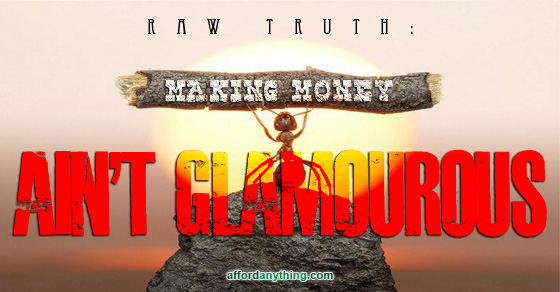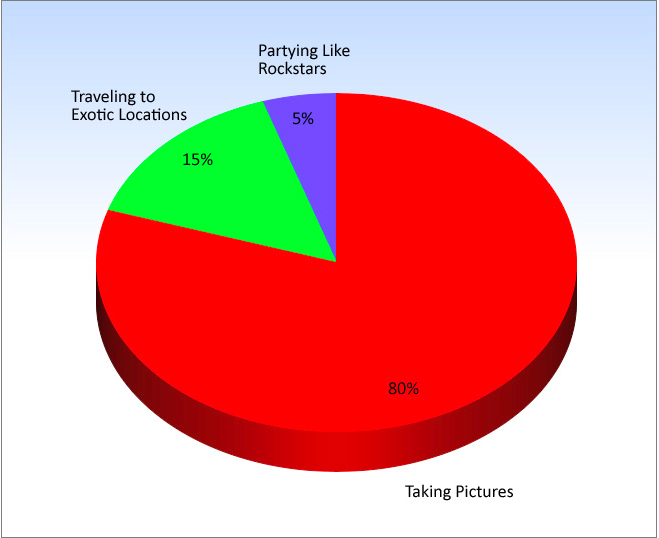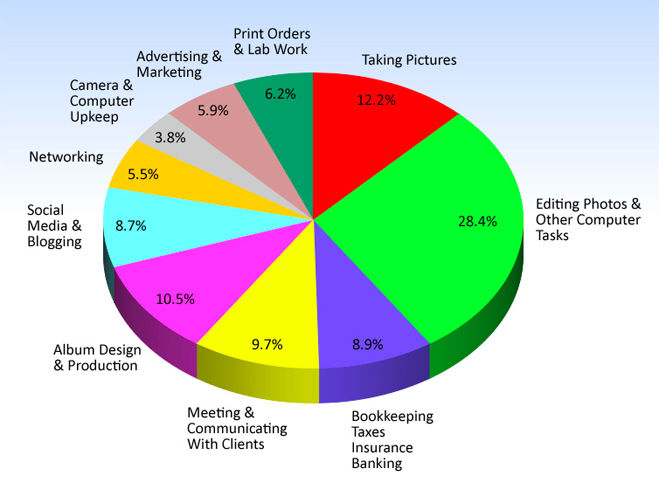The other day I saw this great graphic comparing How People Think Professional Photographers Spend Their Time vs. How They Actually Spend Their Time:
(Click “display images” if you’re reading this by email.)
People who work in “glamourous” industries often face these misconceptions.
“Oh, you’re a journalist! You can jet off to Paris as an international correspondent …”
“Wow, you’re a freelance writer – like Carrie Bradshaw! You write whatever’s on your mind without doing any research or interviews and you make $5 a word!”
“You do public relations or event planning? That’s cool. You go to swanky parties …”
It Ain’t All Champagne and Caviar
A friend of mine applied for an editor position at Maxim magazine. He wrote in his cover letter: “Don’t worry. I’m not under the impression that the office is filled with bikini-clad models spraying champagne on each other.” That line earned a good chuckle with the hiring editors — and landed him an interview.
It’s funny because its true. Loads of applicants carried that impression.
Years ago, I applied for an editorial position at a boutique wine magazine. During the interview, the managing editor told me that my application stood out because I emphasized the work — being an editor — rather than the hook, wine.
“I read hundreds of applications from people who said they’re passionate about wine,” he told me, “and I thought, well, that’s great, but can you edit a magazine?”
Will had the same experience when he ran a solar energy company. He’d receive a deluge of applications from people who said “I love solar energy!” or “I’m passionate about the environment!”
“That’s fine,” he thought, “but how proficient are you with Quikbooks?”
Conversely, when he entered his current line of work — running a highway construction company — his buddies from his eco-preneur days predicted that he’d hate it.
“Road work? That’s so boring!” they said. He transitioned from a glamourous industry to an industry that kills conversation at cocktail parties, and no one could figure out why.
“I like growing companies,” he explained. “I like managing a business. That’s the appeal.” But few people understood. They heard the words “asphalt” and “traffic cones,” and they tuned out.
Most Millionaires Work in Boring Industries
But here’s a reason they should tune in: most millionaires work in “dull-normal” industries, according to Thomas Stanley and William Danko, authors of The Millionaire Next Door.
“We are welding contractors, auctioneers, rice farmers, owners of mobile-home parks, pest controllers, coin and stamp dealers, and paving contractors,” the book says.
Why are millionaires clustered in dull-normal jobs? It’s partly because there’s less competition. Millions of people flock to glamourous industries. Heavy competition drives down profit margins and payrates.
Few people, by contrast, are elbowing each other for a slice of the pest-control pie. It’s a dirty job. When competition is lower, profits and payrates may be higher.
The bottom line? Making money isn’t always glamorous.
Source: International Society of Professional Wedding Photographers


